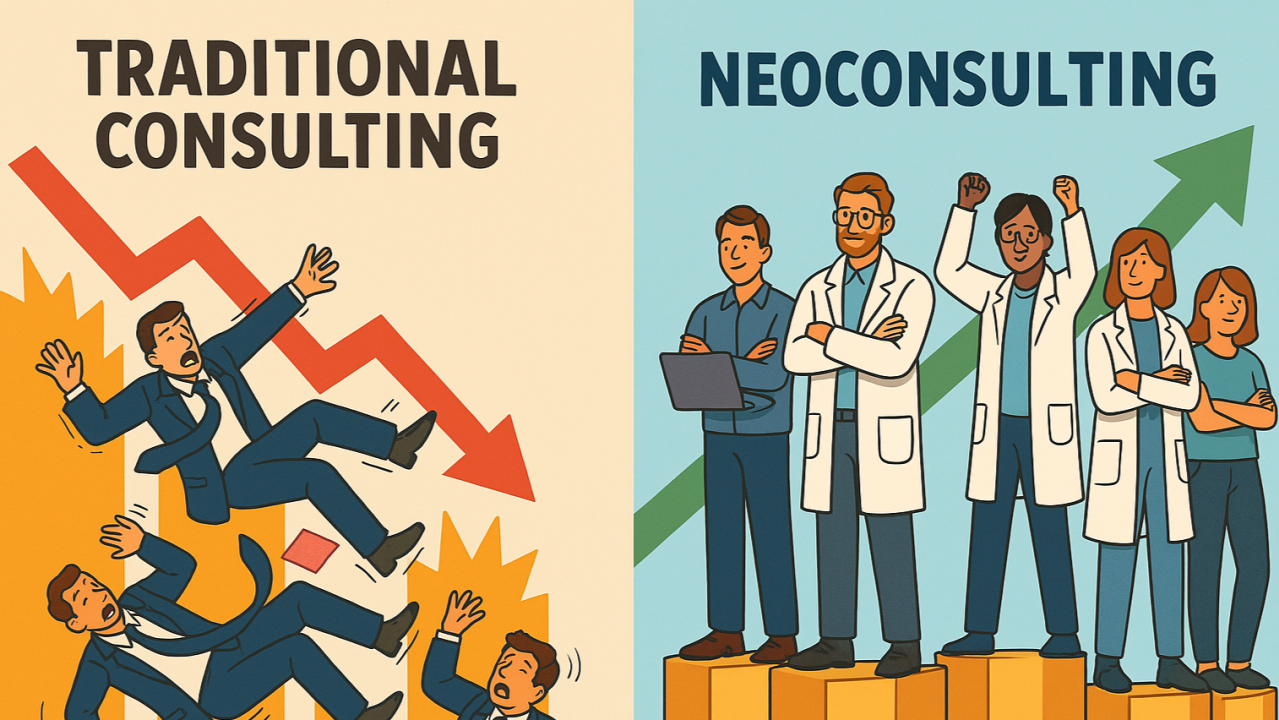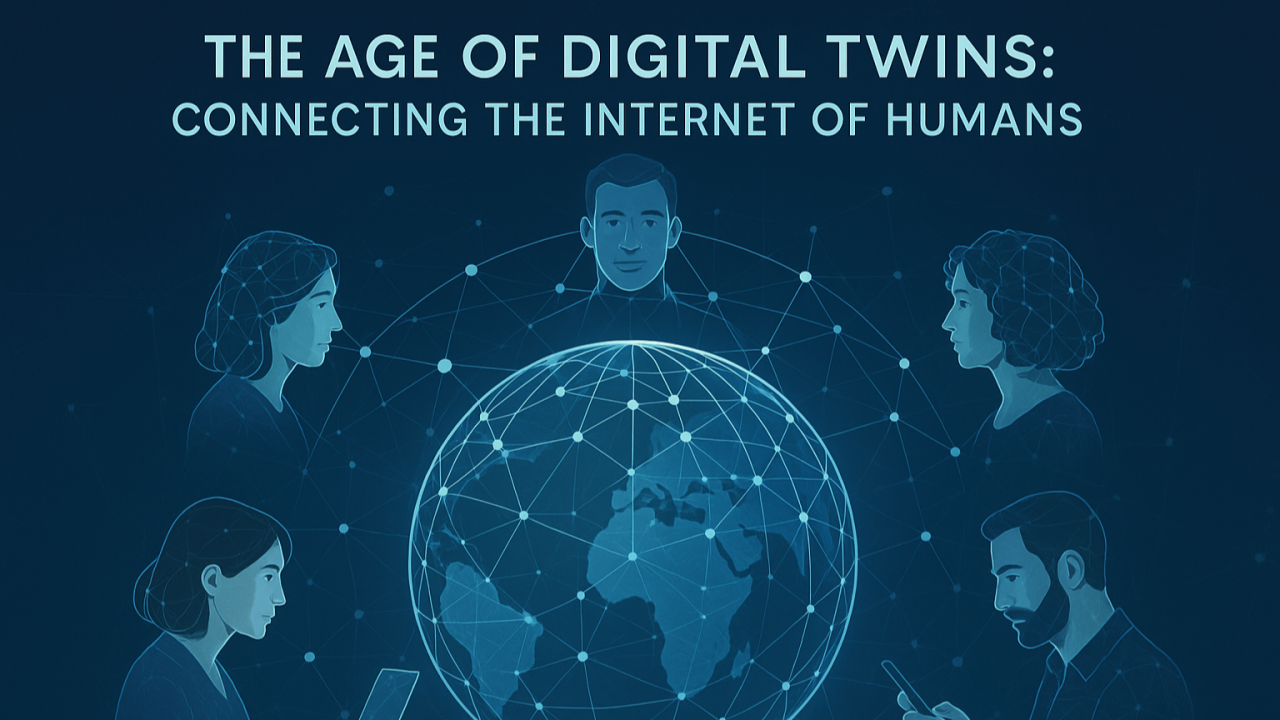The consulting industry, long dominated by traditional powerhouses, is undergoing a seismic shift. Recent mass layoffs at firms like Accenture and PwC, coupled with high-profile audit scandals, have exposed deep-rooted flaws in conventional consulting models. As businesses increasingly demand genuine solutions over dependency-driven engagements, neoconsulting emerges as the imperative path forward.
The Crumbling Edifice of Traditional Consulting
Historically, major consulting firms have thrived on a model that often prioritized prolonged engagements over delivering actionable, sustainable solutions. This approach not only fostered client dependency but also led to ethical compromises, as evidenced by numerous audit failures and financial misrepresentations.
Erosion of Trust: A Series of Scandals
The integrity of the consulting industry has been severely undermined by a series of scandals involving major firms:
- PwC’s Audit Failures: In recent years, PwC faced significant penalties for its deficient audits. Notably, the firm was fined £2.9 million by the Financial Reporting Council (FRC) for multiple failures in auditing Wyelands Bank’s 2019 accounts, a bank previously owned by Sanjeev Gupta. The audit shortcomings included inadequate understanding of the bank’s operations and failure to comply with regulations leading now to multiple geographies resigning from cooperation, like Saudi Arabia. In March 2025, Saudi Arabia’s Public Investment Fund (PIF) temporarily banned PwC from providing consulting and advisory services until February 2026.
- KPMG’s Missteps:KPMG has also been under scrutiny for its auditing practices. The firm was fined £14.4 million for misconduct related to its audit of Carillion, a construction giant that collapsed under significant debts. The tribunal revealed that KPMG staff created false meeting minutes and retroactively edited documents, highlighting severe ethical breaches.
- EY’s Ethical Lapses:Ernst & Young (EY) admitted that its employees cheated on ethics exams, leading to a $100 million fine by the Securities and Exchange Commission (SEC). This revelation is particularly damning, considering the firm’s role in upholding financial integrity.
- Deloitte’s audit issues: The Polish Audit Supervision Agency (PANA) has imposed record penalties totaling nearly PLN 17.7 million on Deloitte Audyt sp. z o.o. citing irregularities in audits of financial statements from 2017, 2018, and 2020. The fines—PLN 12.57 million and PLN 5.09 million—reflect violations in quality control, professional skepticism, and regulatory compliance. The penalties, finalized after mediation requested by Deloitte, mark the largest in Poland’s auditing history. Deloitte has stated it disagrees with some of the findings, but has addressed PANA’s recommendations to ensure compliance moving forward. The regulator has also scrutinized Deloitte’s role in auditing GetBack’s financial statements prior to the company’s collapse.
Market Rejection of Copy-Paste Consulting
The cumulative effect of these scandals has led to a significant erosion of trust between clients and traditional consulting firms. Businesses are increasingly wary of advisors who offer generic, one-size-fits-all solutions that fail to address unique challenges. The market’s disillusionment is further amplified by:
- Conflicts of Interest:The blurred lines between auditing and consulting services have raised concerns about objectivity. For instance, KPMG announced it would cease non-audit work for FTSE 350 companies it audits to eliminate perceived conflicts of interest.
- Loyalty Issues: Firms juggling multiple clients within the same industry risk compromising the confidentiality and specificity of their advice, leading to recycled strategies that lack innovation.
- Audit Scandals: Repeated audit failures have not only resulted in hefty fines but have also damaged the reputations of these firms, causing clients to question their reliability and ethical standards.
The Rise of Neoconsulting
In response to these challenges, neoconsulting has emerged as a paradigm that emphasizes:
- Tailored Solutions: Developing strategies that are customized to the specific needs and contexts of clients, moving away from generic frameworks.
- Transparency and Ethics: Upholding the highest ethical standards to rebuild trust, ensuring that client interests are prioritized without hidden agendas.
- Empowerment Over Dependency: Focusing on equipping clients with the tools and knowledge to sustain improvements independently, rather than fostering prolonged reliance on consultants.
A Call to Action
The consulting industry’s transformation is not merely a trend but a necessity. Firms that continue to operate under outdated models risk obsolescence in a market that demands authenticity, accountability, and real value. Embracing neoconsulting principles is not just advantageous but essential for those seeking to navigate and lead in this new era.
As we stand at this crossroads, the choice is clear: adapt and thrive by delivering genuine, ethical, and customized solutions, or persist with antiquated practices and face inevitable decline. The future of consulting lies in the hands of those ready to redefine its purpose and practice for the betterment of businesses and society at large.



